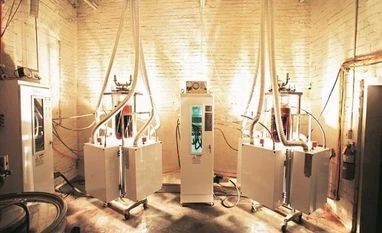An investment in American liquor maker Lost Spirits by Delhi-based Jagatjit Industries is aiming to advance the production time and reduce the cost of making liquor, or in other words do for the alcohol business what synthetic lab processes have for the diamond trade.
Jagatjit Industries, which last year reported revenues of Rs 1,150 crore, acquired an undisclosed minority stake in Lost Spirits in 2017.
Roshini Jaiswal, chief restructuring officer at Jagatjit Industries, best-known for its Aristocrat-branded range of spirits, says that “the notion is to bring Lost Spirits technology of refining liquor quicker, and cheaper to India and improve not just our labels but also explore B-2-B opportunities for other manufacturers”, she says, adding that a Lost Spirits-designed reactor will be up and running by year end at Jagatjit's factory in Hamira, Punjab.
So how does it all work? Typically, an aged spirit is placed in barrels of special wood that infuse the liquor with flavour for a certain number of years. It could be 12 years, 18 years, or 24 years, as is the case with many pedigreed malts. That development time is slashed down to days with Lost Spirit's process, which pushes liquor through an industrial-size distillation machine, which infuses wood with specific blasts of heat and results in desired flavours in five-seven days.
The process, which uses high-voltage light directed into a reactor, along with wood chips and alcohol, at very specific temperatures and is patented, has already been in commercial use in America for the past two years, successfully in brands called Abomination and Navy Rum, made by Lost Spirits. The process also reduces Indian dependence on foreign-made raw material, i.e. spirits, and, all in all, the cost reduction could be around 40 per cent with the new technology.
As an example, most premium and semi-premium Indian whisky brands buy a certain proportion of scotch to blend with their own brew, be it Royal Challenge, or Royal Stag, or Blender’s Pride. There is a limit and that is the tech can't produce flavours aged more than 20 years, Jaiswal says.
India’s spirits business, 307 million cases a year, has been subject to recent upheavals that started with declining sales when demonetisation kicked in, then got further squeezed when prices of commodities, glass and ENA (base spirit) shot up, adding around Rs 75 to the cost of each case. Unlike most industries, liquor manufacturers require state permission to increase prices.
While the IWSR (International Wines and Spirits Record) data for almost all spirits such as vodka, gin and others will show a slowdown because of the above factors, scotch was the only category that grew at 7 per cent a year but is tiny with volumes of some 3 million cases. It’s the “other whiskey” category, which includes semi-premium whiskey, grew at 7 per cent a year to 26 million cases. “That’s the category that could both use the technology and see a huge make-over in both price and taste,” Jaiswal hopes.
According to a sector analyst who declined to be named, India consumption of scotch whiskey is among the highest in the world and its import volumes in the top five. “This consumption is not slowing down, no matter what people say about red wine and vodka and other spirits. The thing is that super premium whiskey is always at the top of the wine list,” he adds.
That's just one reason why Jagatjit is looking at new-age technology to slash the cost of making premium liquor. “Premium” in India is defined as any spirit that costs between Rs 600 and Rs 900 per bottle. Examples are Signature Blend of Diageo, or Blender's Pride of Pernod-Ricard.
Moreover, super premium spirits in the subcontinent are growing. Amrut Fusion single malt whiskey was ranked among the best in the world in 2009. Goa-based John Distilleries’ Paul John Single Malt was introduced in 2008. Radico-Khaitan's single malt Rampur debuted in 2016 and Khoday's plans to push Peter Scot Black, another single malt, into stores by 2020.
Amar Sinha, chief executive officer, Radico-Khaitan, says liquor is unlike any other FMCG product, and needs very high involvement. “Look and feel requires a lot of stability but there are two areas of innovation — process and packaging.” Sinha adds that India is a good example where a lot of process innovation has started. “Twenty years ago no one thought top-ranked malts would be made here. Twenty years from now, India will be competing with British, European and American markets in categories split equally between mass and high-quality products,”
he says.
Unlock 30+ premium stories daily hand-picked by our editors, across devices on browser and app.
Pick your 5 favourite companies, get a daily email with all news updates on them.
Full access to our intuitive epaper - clip, save, share articles from any device; newspaper archives from 2006.
Preferential invites to Business Standard events.
Curated newsletters on markets, personal finance, policy & politics, start-ups, technology, and more.
)